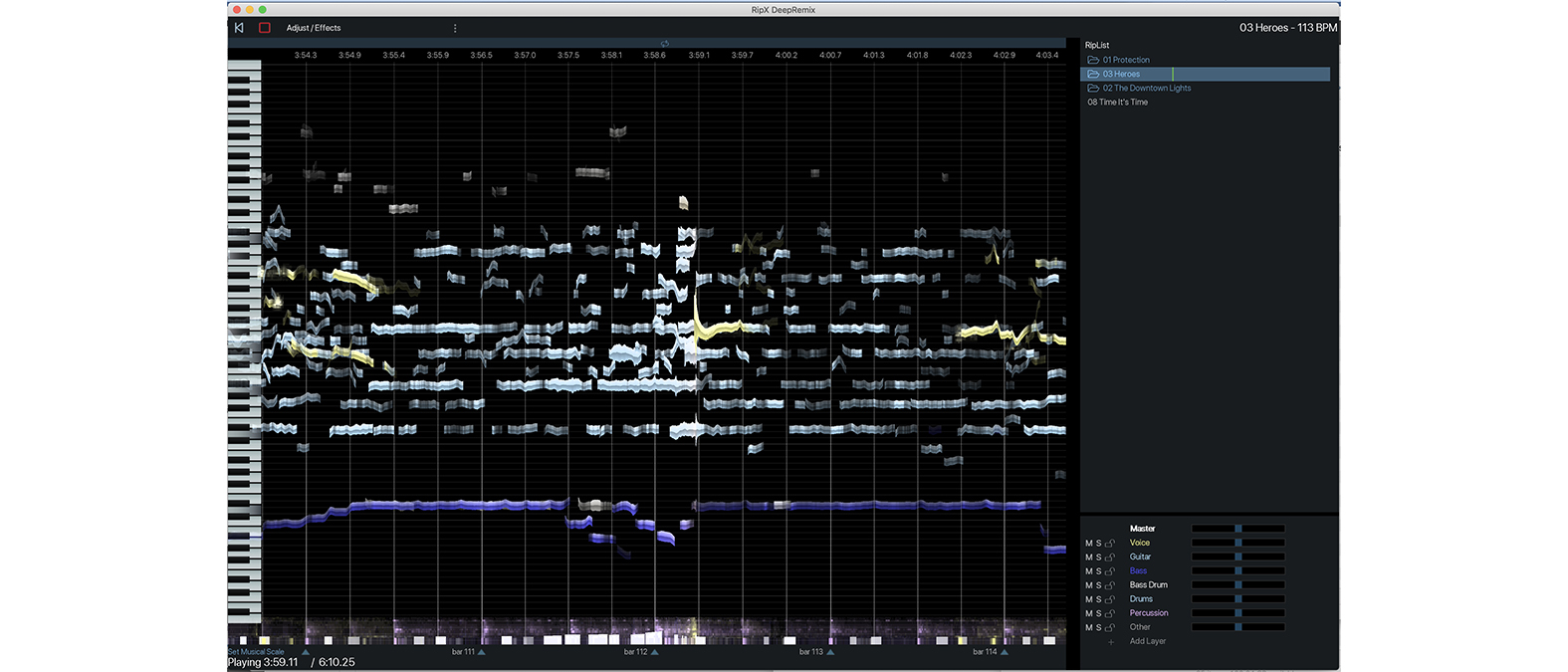MusicRadar Verdict
Surprisingly decent extraction tool, but then turns into a highly creative audio editor, remix and mashup application.
Pros
- +
Easy to use extraction software.
- +
Good results with vocals - fewer artefacts than with other software.
- +
Not just extraction as there are other editing options.
Cons
- -
Quality still varies depending on which mix part you have selected.
MusicRadar's got your back
What is it?
We’re always getting asked about plugins that split a song into its component multitrack parts – bass, vocals, drums and so on. There have been a few attempts, the most recent that we’ve reviewed being Audionamix’s Xtrax Stems. It’s fair to say so far, that artefacts are usually present in the results and you never really get the pristine original ‘black magic’ multitracks that you’d possibly anticipated.
The latest wizard to attempt that magic is Hit ‘n’ Mix’s RipX platform with two modules: DeepRemix (on test here) and the more expensive DeepAudio, which is a free update to the company’s Hit’n’Mix Infinity (and there’s more on this version in the box below).
While the star of the show on this new RipX platform is audio separation, it’s also about what you can do with the stems once you have them that should also grab the headlines; as it turns out, there’s a lot more on offer.
The ripping part of de-mixing your stereo file into its component parts is the first port of call though and is simply a matter of dragging your target music file into the UI. So grab a song (MP3, audio etc) and decide which parts you want to extract, those options being Voice, Other Sounds & Instruments, Bass and Drums & Percussion (we generally checked all four). If you choose Save Stems Only, you get the results handily placed in your downloads folder for direct DAW import.
Then choose Quality versus Speed using a simple slider which is pretty self-explanatory and, as you might expect, choosing Quality (which we always selected) means the process is longer, as is choosing lengthier songs.
Performance and verdict
In our tests, we were getting anything between 25 and 35 minutes on an oldish iMac 3.4GHz, so expect better results if you have more grunt. And Hit ‘n’ Mix add, “a slightly lower Quality can make good speed improvements, often without noticeable reduction in Quality”.
Once ripped, the resulting audio stems are listed bottom right of the UI and you can choose to mute or solo each. You actually get more tracks here including Guitar and separated Drums and Percussion. Each is then shown Melodyne-like across the main screen, with pitch indicated by a piano roll and time left to right. Click between each to see an individual stem.
Want all the hottest music and gear news, reviews, deals, features and more, direct to your inbox? Sign up here.
As to the results, we have to say that we are pleasantly surprised at how good the vocals are. Yes, there are artefacts but less than we recall with Xtrax Stems; you perhaps still wouldn’t use them solo but definitely so in a mix. The drums are less impressive individually – the kick a little muffled and the percussion ‘sibilanty’ – but work well together. Guitar can be basically anything in that frequency range (it is ‘synth’ on Blue Nile’s Downtown Lights), and ‘Other’ we generally find to be something that might be important in the context of a mix, but not often something you’d want to solo!
Whatever, we now have Bowie’s Heroes vocal ready to do with what we will, and that includes instant pitch-shifting and time-stretching sections or notes, although these inevitably introduce more artefacts. More exciting is the ability to copy the odd verse or chorus from one ripped song to another and then pitch shift it to mix. We had Tracey Thorn’s vocal from Massive Attack’s Protection joining Bowie – what a combo – pretty easily. There’s a lot more fun to be had with effects, and even more should you shell out on DeepAudio.
Overall, we’re impressed, especially as previous experiences of this type of software can leave you a little deflated as the end result is very much just audio stems with artefacts. Here the quality is better, and what you can do with that audio is very creative indeed – well beyond extraction and an easy step into the worlds of remixing and mashups.
DeepAudio - is it worth the extra?
We have RipX: DeepRemix (£79) on test here, but the RipX platform also boasts a more ‘pro’ module in the form of DeepAudio. This will set you back a heftier £299 but comes with everything you get in DeepRemix plus quite a few extras. These include the Audioshop suite which includes a Harmonic Editor; Clone, Draw Audio and Draw Pitch tools, plus a, reverb, time-stretch and other effects.
We also like the very cool instrument replacement option in DeepAudio where you can ‘play’ one instrument with another audio part. Finally, you get options to create your own tools plus a chord editor.
Of the two, though, we’d recommend the cheaper DeepRemix, simply because it comes with the headline-grabbing bits, and you can always upgrade to DeepAudio later. There’s full comparison between the two modules on the Hit ‘n’ Mix website.
MusicRadar verdict: Surprisingly decent extraction tool, but then turns into a highly creative audio editor, remix and mashup application.
Hands-on demos
Hit'n'Mix
Computer Music magazine is the world’s best selling publication dedicated solely to making great music with your Mac or PC computer. Each issue it brings its lucky readers the best in cutting-edge tutorials, need-to-know, expert software reviews and even all the tools you actually need to make great music today, courtesy of our legendary CM Plugin Suite.

